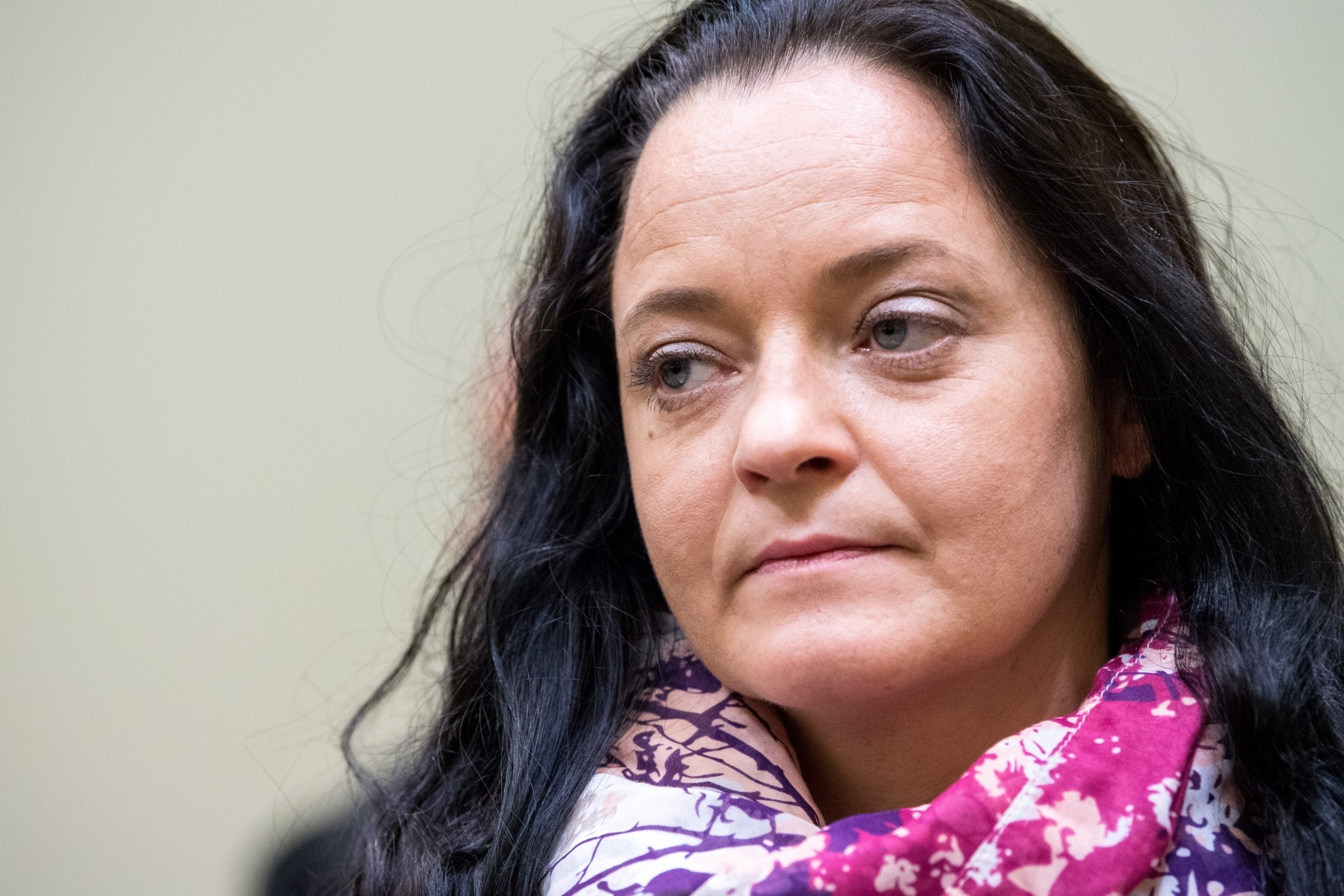Beate Zschäpe: Germany's 'Nazi bride' found guilty of 10 racially motivated murders
National Socialist Underground gang killed eight Turks, a Greek and a German policewoman between 2000 and 2007

The founder of a German far right group dubbed the “Nazi bride” by the country’s media, has been found guilty for her part in 10 racially motivated murders.
Beate Zschäpe was sentenced to life in prison for her role in the killings which targeted migrants between 2000 and 2007 and led to accusations of embedded racism within Germany’s security agencies.
The 43-year-old was a founder of the National Socialist Underground (NSU), a neo-Nazi gang whose members killed eight Turks, a Greek and a German policewoman, the Higher Regional Court in Munich ruled.
She had denied taking part in the murders with two men, Uwe Böhnhardt and Uwe Mundlos, who took their own lives in 2011 when police discovered the gang by chance.
During the trial, she said through her lawyer that she felt morally guilty for not stopping them. Last week, Zschäpe told the court she did not know how the victims were chosen and she only realised the full extent of the crimes after she turned herself in.
Her lawyers had urged judge Manfred Göetzl to convict her of the lesser charges of arson and robbery. But she was found guilty of 10 counts of murder.
Delivering the toughest sentence available to him, Judge Goetzl told a packed Munich courtroom that Zschäpe’s guilt weighed particularly heavily, meaning she is likely to serve at least 15-years in prison.
The 43-year-old showed no emotion as he read out her sentence.
The NSU attacks were the most violent of their kind in Germany since the end of the far-left Red Army Faction’s two-decade killing spree in 1991, which left at least 34 dead.
Zschäpe was arrested in 2011, shortly after her two accomplices were found dead in an apparent murder-suicide.
Together with Mundlos and Böhnhardt, she formed the NSU, a group that pursued an ideology of white racial supremacy by targeting migrants, mostly of Turkish origin.
They evaded arrest for almost 14 years, thanks to a network of supporters and repeated mistakes by German security agencies.
Anti-migrant sentiment that underpinned the group’s ideology was particularly strong in eastern Germany during the early 1990s, when Mundlos, Böhnhardt and Zschäpe were in their late teens and early twenties. The period saw a string of attacks against migrants and the rise of far-right parties.
The case against Zschäpe hinged heavily on the question of whether judges would hold her equally culpable for the killings as her two dead accomplices, even though there was no evidence she had been physically present during the attacks.
But prosecutors said she had played a key role behind the scenes, planning the killings and arranging money and alibis.
The murders shook a country that believed it had learned the lessons of its past. A report in 2014 said police had “massively underestimated” the risk of far-right violence and that a series of missteps had allowed the cell to go undetected.
Zschäpe rarely spoke during the five-year trial, refusing to answer questions from lawyers representing the victims’ families. Towards the end, she expressed regret for their loss and described herself as “morally guilty” but urged the court not to convict her “for something that I neither wanted nor did.”
Families of the victims said suspicion directed towards their loved-ones shook their faith in the German justice system. Police had originally focused on whether the victims had ties to organised crime – a line of investigation for which there was never any evidence.
“The investigation went in the wrong direction, not due to the failure of individuals but due to institutional racism,” said Alexander Hoffmann, a lawyer representing victims of a 2004 bomb attack in Cologne.
He urged federal prosecutors to continue investigating the NSU’s wider network of supporters, believed to be much broader than the four men on trial with Zschäpe. The four men were found guilty of supporting the group in various ways and sentenced to prison terms of between two and 10 years.
Zschäpe’s lawyer, Mathias Grasel, said he would appeal against the ruling.
“The verdict is wrong,” he said in a statement. “Conviction for complicity is legally untenable. The fact is: Zschäpe was demonstrably present at no crime scene and never fired a weapon or detonated a bomb.”
Additional reporting by agencies
Join our commenting forum
Join thought-provoking conversations, follow other Independent readers and see their replies
Comments